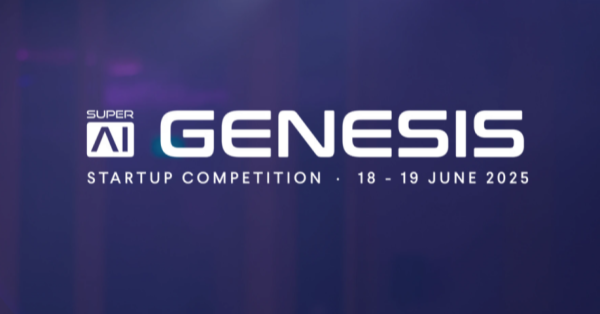- SuperAI Singapore (18-19 June 2025) will unite Eastern and Western AI ecosystems under one roof at Marina Bay Sands, from emerging startups to established enterprise leaders
- Three distinct stages, alongside a Hackathon and Startup Competition with over $200,000 in prizes, will showcase innovations in robotics, healthcare, finance, and beyond
- First wave of speakers includes Emad Mostaque (Intelligent Internet), entrepreneur Balaji Srinivasan, and analyst Benedict Evans – with 150 more visionaries to be announced
SuperAI, the premier artificial intelligence conference and super-connector event, returns to Singapore for its highly anticipated second edition. Following last year’s successful launch, the event is scaling significantly, transforming Marina Bay Sands’ entire fifth level into a showcase of frontier technologies on June 18-19, 2025.
Last year’s inaugural event drew 5,000 attendees from over 90 countries. This year, SuperAI is on track to connect more than 7,000 founders, developers, researchers, investors, and enterprise leaders, converging to explore and unveil the next wave of transformative AI technologies.
“The response to SuperAI Singapore has been extraordinary, already surpassing last year’s demand,” said Peter Noszek, Co-Founder of SuperAI. “We’re seeing genuine hunger for meaningful conversations at the frontier of AI – not just theoretical potential, but real-world implementation. SuperAI will spotlight breakthroughs in robotics, healthcare, finance, and AI’s broader impact across industries and society. Singapore’s position at the crossroads of East and West makes it the perfect hub to unite the global AI ecosystem.”
The event will feature sessions exploring topics like “Robotics Renaissance: AI’s Role in Automating the Physical World,” “Inside China’s AI Revolution,” and “Human-AI Collaboration: Unlocking Creative Potential” across its expanded program.
SuperAI will showcase AI development at every stage in the innovation lifecycle. Fifteen developer teams will compete in the inaugural NEXT Hackathon – in collaboration with Amazon – using generative AI-powered software development tools to build working prototypes across the event’s five thematic pillars: robotics and embodied AI, healthcare and biotech, finance, climate tech, and decentralized intelligence.
Meanwhile, ten frontier AI startups – selected from hundreds of global applicants – will vie for the Genesis Startup Competition’s $200,000 prize pool, supported by AWS, along with enterprise matchmaking and fundraising opportunities to accelerate their growth.
Elsewhere on the exhibition floor, SuperAI will offer pathways for academics, researchers, ambitious students, and curious minds through immersive and interactive experiences. Breakout AI Labs are where visitors can co-create with AI-enabled software, hardware, and their intersection in robotics. Community Hubs are exclusive, partner-led spaces designed for influential AI communities to explore specialized topics and foster meaningful connections.
The first wave of speakers announced this week includes Emad Mostaque (CEO, Intelligent Internet), Balaji Srinivasan (Founder, Investor, and Author of The Network State), Benedict Evans (Analyst), and Sharon Zhou (CEO, Lamini AI).
Industry data underscores AI’s accelerating momentum. TechCrunch reports AI investments jumped 62% to $110B in 2024, while McKinsey finds 78% of organizations now use AI—up dramatically from just 20% in 2017. Financial thought leader Raoul Pal captures the zeitgeist: “Everybody wants to know what’s going on in AI. SuperAI is the event to figure it out.”
For tickets, speaker updates, and partnership opportunities for SuperAI Singapore, visit www.superai.com.
Peter Noszek, Co-Founder of SuperAI, is available for an interview.
About SuperAI Singapore
SuperAI is Asia’s largest AI event. Showcasing the transformative power of artificial intelligence, SuperAI brings together frontier technology visionaries, developers, startups, enterprises, researchers, and policymakers to shape the future. Taking place 18-19 June 2025 at the iconic Marina Bay Sands, SuperAI Singapore will convene over 7,000 attendees from more than 100 countries to explore and unveil developments in robotics, health, finance—and AI’s impact across industries and society.






















